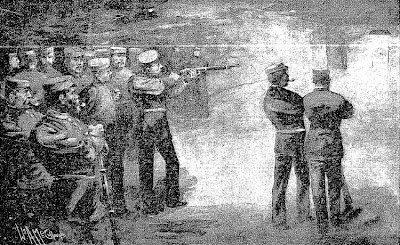Presser v. Illinois
Case Overview
CITATION
116 U.S. 252 (1886)
ARGUED ON
November 23-24, 1885
DECIDED ON
January 4, 1886
DECIDED BY
OVERRULED BY
McDonald v. Chicago (2010)
Legal Issue
Does the Second Amendment prevent states from passing laws restricting the organization of private militias?
Holding
No, the Second Amendment places limitations on the federal government, not state governments. States can enact legislation to control and regulate militias so long as it does not offend their state constitution.
A Lehr-und-Wehr Verein drill | Credit: Northwestern University Law School
Background
Herman Presser was part of the Lehr und Wehr Verein (Instruct and Defend Association), a citizen militia group made up of armed ethnic German workers associated with the Socialist Labor Party. In December 1879, Presser led about 400 members of the citizen militia through the streets of the city of Chicago on horseback. Presser was armed with a cavalry sword on the horse and members of the group were armed with rifles. They had no license from the state or federal government.
On September 24, 1879, Presser was indicted because he “did unlawfully belong to, and did parade and drill in the city of Chicago with an unauthorized body of men with arms, who had associated themselves together as a military company and organization, without having a license from the Governor, and not being a part of, or belonging to, ‘the regular organized volunteer militia’ of the State of Illinois, or the troops of the United States.”
A motion to quash the indictment against Presser was quashed, and he subsequently pleaded not guilty to the charges. Presser waived his right to a trial by jury and was instead tried by the Court, who found Presser guilty and imposed a fine of $10. Presser appealed, claiming the law he was charged under violated his rights protected by the Second Amendment.
Summary
Unanimous decision for Illinois
Presser
Illinois
Waite
Blatchford
Matthews
Harlan
Field
Miller
Gray
Bradley
Woods
Opinion of the Court
In a per curiam opinion, the Court ruled that the “conclusive answer to the contention that this amendment prohibits the legislation in question lies in the fact that the amendment is a limitation only upon the power of congress and the national government, and not upon that of the state.” The Court reaffirmed its decision in United States v. Cruikshank (1876) that the Second Amendment limits only the federal government, not the states. The Court explained, however, that while states may limit firearm ownership, they “cannot, even laying the constitutional provision in question out of view, prohibit the people from keeping and bearing arms, so as to deprive the United States of their rightful resource for maintaining the public security, and disable the people from performing their duty to the general government.”
The Court also rejected Presser’s argument that the Constitution protected his right to assemble, drill, or march in a militia independent of statutory authority from the federal or state government, writing, “[m]ilitary organization and military drill and parade under arms are subjects especially under the control of the government of every country. They cannot be claimed as a right independent of law. Under our political system they are subject to the regulation and control of the State and Federal governments, acting in due regard to their respective prerogatives and powers. The Constitution and laws of the United States will be searched in vain for any support to the view that these rights are privileges and immunities of citizens of the United States independent of some specific legislation on the subject.”









